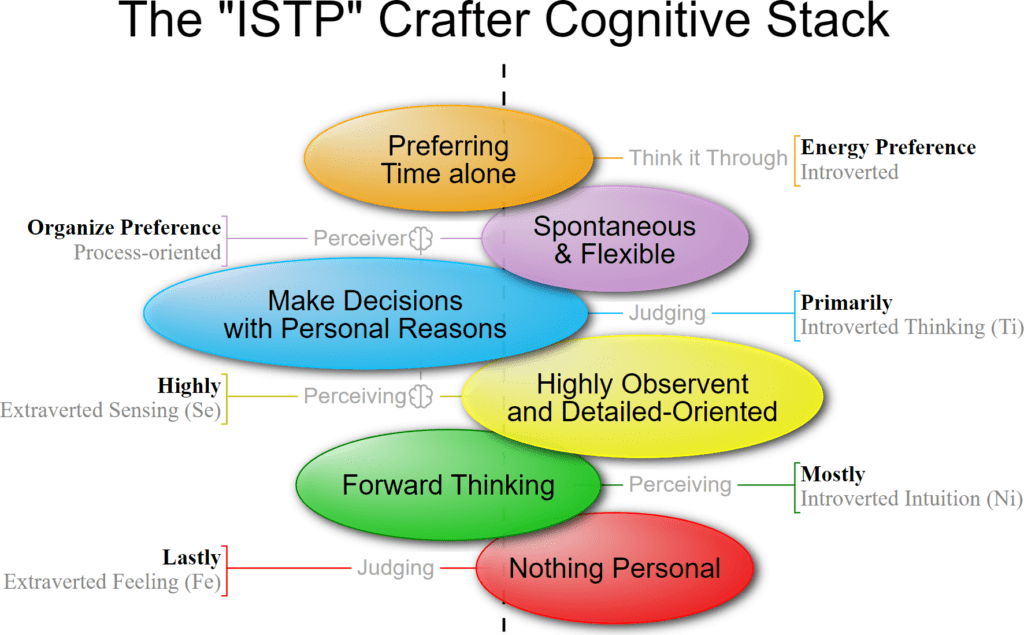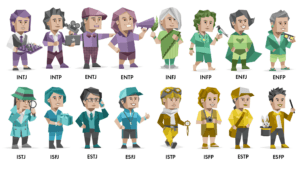What is the MBTI ISTP “Crafter” Personality Type?

People with ISTP Personality Type enjoy having time to think alone and are fiercely independent.
Crafters enjoy new experiences and can become bored with routines rather quickly.
They like hands-on activities, the freedom to work at their own pace, and taking things apart to see how they work.
With Introverted Thinking as their dominant function, Crafters use logical and rational personal subjective reasons when making decisions.
With Extraverted Sensing as their top extraverted function, Crafters are Perceivers who like gathering facts and are highly observant and detail-oriented.

Crafters are more interested in practical applications and exploring new ideas with their introverted intuition, with little emotion from the lowest function of their extraverted feelings.
Crafters are introverted, preferring time alone to think things through. They are process-oriented, spontaneous, and flexible.
Crafters are “Concrete Perceivers” with Introverted Thinking and Extraverted Sensing. When feeling threatened, they speak in a dry, emotionally detached way; they are more practical, referring to specific details and issues. They may also behave with the Computer Satir Communication Style.
ISTP Personality Type cross-reference
- Keirsey Type – Crafter
- Temperament Type – Sanguine
- Animal Type – Golden Retriever
- DISC Type – Steadiness
- Socio-Communicative Type – Amiable
- True Colors – Orange
- Color Code – Yellow
- Personality Compass – South
- Occupational Type – Conventional
- Learning Type – Reflector
- Leadership Type – Accommodator
Enneagram Types
The Enneagram is a Personality Typing System comprising nine different types.

Dominant Function – Introverted Thinking
- They spend much time thinking and dealing with information in their heads.
- This means they do not spend much time expressing themselves verbally, so they are often known as being quiet.
- It may seem like their approach to decision-making is very haphazard.
- Yet, their actions are based upon careful observation and thought.
- They deal with the world rationally and logically, often focusing on practical and useful things.
- Because they are so logical, they are good at looking at situations objectively and avoiding subjective or emotional factors when making decisions.
- People with this personality type can often be challenging to get to know because they focus so much on action and results rather than emotions.
Auxiliary Function – Extraverted Sensing
- They prefer to focus on the present and take on things one day at a time.
- They often avoid making long-term commitments and would instead focus on the “here and now” rather than think about plans and possibilities.
- They tend to be very logical and enjoy learning and understanding how things operate.
- They might take apart a mechanical device to see how it works.
- While they are good at understanding abstract and theoretical information, they are not particularly interested in such things unless they can see some practical application.
Tertiary Function – Introverted Intuition
- This function often operates unconsciously in the ISTP personality.
- While they are not usually interested in abstract ideas, they may take such concepts and try to turn them into action or practical solutions.
- This function is behind the “gut feelings” they sometimes experience when deciding.
- This aspect of personality may be responsible for sudden “aha” moments of insight by synthesizing information brought in by the dominant and auxiliary functions.
Inferior Function – Extraverted Feeling
- This aspect of personality tends to operate in the background of the ISTP personality, but it can become more apparent during stress.
- During highly charged situations, they can sometimes lash out in sudden outbursts of emotion.
- They often ignore their feelings until they reach a boiling point, which can lead to displaying emotions in inappropriate ways.
ISTP Traits
ISTPs are independent, adaptable, and objective. They are often described as quiet but with an easygoing attitude toward others.
While they have little respect for rules imposed upon them, they strictly follow their own internal rules. If someone violates the principles they hold in high regard, they become hostile and stubborn.
They are not well attuned to others’ emotional states and can sometimes be seen as insensitive.
Their primary function is Introverted Thinking, allowing them to analyze data and notice inconsistencies.
Their auxiliary function is Extraverted Sensing, which makes them hands-on people who process data through their five senses.
They enjoy new experiences and may often engage in thrill-seeking or risk-taking behaviors.
ISTPs work best in an environment where they can work freely and view rules as hindering their spontaneity. They enjoy working with their hands while evaluating a complex system.
They are spontaneous and prefer reacting to the current situation rather than following a plan.
When there is a problem, they want to understand the underlying cause and implement some solution quickly.
While they tend to be reserved, this does not mean they do not experience strong emotions. They prefer to judge based on objective criteria rather than personal beliefs or values.
Strengths
- Logical
- Learns by experience
- Action-oriented
- Realistic and practical
- Enjoys new things
- Self-confident and easygoing
Weaknesses
- Insensitive
- Grows bored easily
- Risk-taker
- Does not like commitment
ISTP Relationships
Friendships
- They tend to be curious and adventurous but must also be alone sometimes.
- You can be a great friend by asking them to get out and pursue new things, but be ready to respect their need for peace when not feeling up to going out.
Personal Relationships
- They are quiet and reserved introverts.
- They thrive on new experiences and dislike strict routines.
- In relationships, they are highly independent and do not like to feel controlled.
- Making commitments is difficult for them, but they will put much effort into relationships that interest them.
- They do not often share their emotions with other people.
- While they enjoy hearing other people’s opinions, they frequently keep their opinions to themselves.
- For this reason, people sometimes describe them as challenging to get to know.
- They often find friends who enjoy similar hobbies to those that they do and enjoy spending time with these friends as they pursue these activities.
Partner Relationships
- Long-term commitments can be challenging because they prefer to live here and now.
- You can strengthen your relationship with your ISTP partner by being willing to take things day to day and by respecting their fierce need for independence.
Parenting
- If you are a parent to an ISTP child, you are probably well aware of their independent, adventurous nature.
- You can encourage their confidence by providing safe and healthy opportunities for them to explore things on their own.
- Provide rules and guidance, but be careful not to hover.
- Give your child plenty of hands-on learning, outdoor adventures, and opportunities to experiment with how things work.
ISTP Careers
- Because ISTPs are introverted, they often do well in jobs that require working alone.
- ISTPs dislike too much structure and do well in careers with much freedom and autonomy.
- Because they are very logical, they often enjoy work that involves reasoning and hands-on experience.
- In particular, ISTPs like doing things that have practical, real-world applications.


